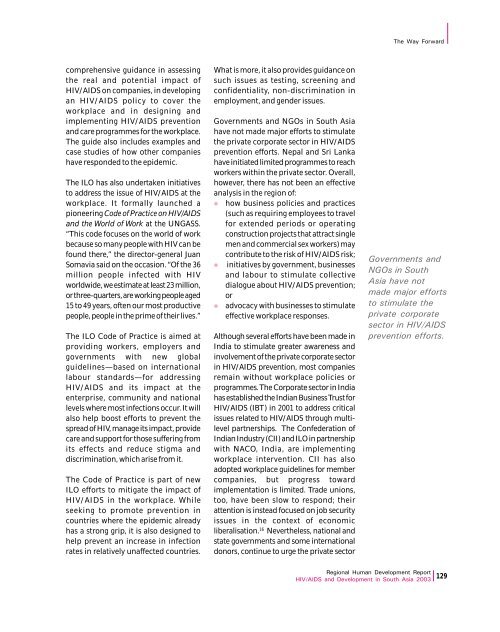Download Report - UNDP Asia-Pacific Regional Centre - United ...
Download Report - UNDP Asia-Pacific Regional Centre - United ...
Download Report - UNDP Asia-Pacific Regional Centre - United ...
Create successful ePaper yourself
Turn your PDF publications into a flip-book with our unique Google optimized e-Paper software.
The Way orwardcomprehensive guidance in assessingthe real and potential impact ofHIV/AIDS on companies, in developingan HIV/AIDS policy to cover theworkplace and in designing andimplementing HIV/AIDS preventionand care programmes for the workplace.The guide also includes examples andcase studies of how other companieshave responded to the epidemic.The ILO has also undertaken initiativesto address the issue of HIV/AIDS at theworkplace. It formally launched apioneering Code of Practice on HIV/AIDSand the World of Work at the UNGASS.“This code focuses on the world of workbecause so many people with HIV can befound there,” the director-general JuanSomavia said on the occasion. “Of the 36million people infected with HIVworldwide, we estimate at least 23 million,or three-quarters, are working people aged15 to 49 years, often our most productivepeople, people in the prime of their lives.”The ILO Code of Practice is aimed atproviding workers, employers andgovernments with new globalguidelines—based on internationallabour standards—for addressingHIV/AIDS and its impact at theenterprise, community and nationallevels where most infections occur. It willalso help boost efforts to prevent thespread of HIV, manage its impact, providecare and support for those suffering fromits effects and reduce stigma anddiscrimination, which arise from it.The Code of Practice is part of newILO efforts to mitigate the impact ofHIV/AIDS in the workplace. Whileseeking to promote prevention incountries where the epidemic alreadyhas a strong grip, it is also designed tohelp prevent an increase in infectionrates in relatively unaffected countries.What is more, it also provides guidance onsuch issues as testing, screening andconfidentiality, non-discrimination inemployment, and gender issues.Governments and NGOs in South <strong>Asia</strong>have not made major efforts to stimulatethe private corporate sector in HIV/AIDSprevention efforts. Nepal and Sri Lankahave initiated limited programmes to reachworkers within the private sector. Overall,however, there has not been an effectiveanalysis in the region of:l how business policies and practices(such as requiring employees to travelfor extended periods or operatingconstruction projects that attract singlemen and commercial sex workers) maycontribute to the risk of HIV/AIDS risk;l initiatives by government, businessesand labour to stimulate collectivedialogue about HIV/AIDS prevention;orl advocacy with businesses to stimulateeffective workplace responses.Although several efforts have been made inIndia to stimulate greater awareness andinvolvement of the private corporate sectorin HIV/AIDS prevention, most companiesremain without workplace policies orprogrammes. The Corporate sector in Indiahas established the Indian Business Trust forHIV/AIDS (IBT) in 2001 to address criticalissues related to HIV/AIDS through multilevelpartnerships. The Confederation ofIndian Industry (CII) and ILO in partnershipwith NACO, India, are implementingworkplace intervention. CII has alsoadopted workplace guidelines for membercompanies, but progress towardimplementation is limited. Trade unions,too, have been slow to respond; theirattention is instead focused on job securityissues in the context of economicliberalisation. 16 Nevertheless, national andstate governments and some internationaldonors, continue to urge the private sectorGovernments andNGOs in South<strong>Asia</strong> have notmade major effortsto stimulate theprivate corporatesector in HIV/AIDSprevention efforts.<strong>Regional</strong> Human Development <strong>Report</strong>HIV/AIDS and Development in South <strong>Asia</strong> 2003 129
















